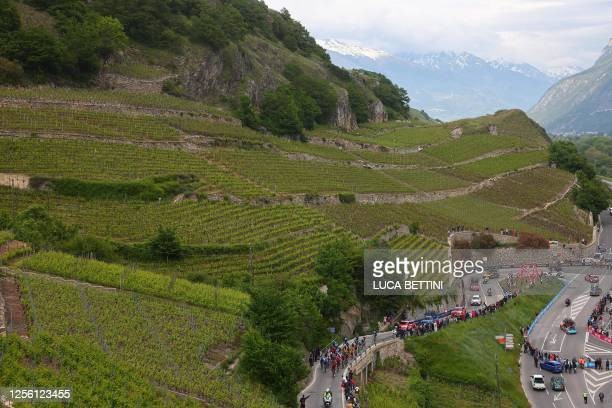
A heat wave in southwest Switzerland has heightened the risk of falling rock and ice in the Alpine area, which has been particularly fatal this year for mountaineers and hikers.
According to the Swiss weather service, a heat wave has driven the zero-degree Celsius threshold to its greatest altitude since records began over 70 years ago in Switzerland, a worrisome new indication for the country's famed glaciers.
Valais regional authorities said a spike in temperatures has prompted accelerated erosion in the Alps.
"With the heat wave of the last few days, and the days to come, the danger level is heightened in the high mountains," regional police spokesman Steve Leger said in an interview.
Casualty of erosion
A total of 17 alpinists or mountaineers who trekked to the highest altitudes in the Alps in the Valais region have died.
The number is more than the annual totals achieved in any of the prior five years.
In addition, six hikers have died this year on lower-altitude trips in Valais.
Only five of the 23 people killed were Swiss. Austrian, Belgian, British, Dutch, French, German, Italian, Roanian, Taiwanese, and Ukrainian nationalities are among the others.
On Wednesday, Valais police reported that a 37-year-old German lady died after falling more than 70 meters (230 feet) while walking her dog on a path in Zermatt, in the shadow of the iconic Matterhorn peak, last week. Her fall's exact reason was being investigated.
Zero-degree limit
The zero-degree limit is an important meteorological indicator, especially in mountainous areas, because it "affects vegetation, the snow line, and the water cycle, and thus has a significant impact on the habitats of humans, animals, and plants alike."
Glaciologists said that the new zero-degree altitude record is a warning sign.
The head of Glacier Monitoring Switzerland (GLAMOS), Matthias Huss, described it as a "change of regime" and "another blow for glaciers" that had already been hammered earlier this year.
"The glaciers were already in a very poor state compared with other years. There was already a lot of melting in June and July, and now this heat is adding to the loss," he added.
Alpine glaciers shattered melting records last year as a result of a combination of low winter snow cover, the arrival of Saharan dust in March, and heatwaves from May to early September.
Between 2021 and 2022, Swiss glaciers lost around 6% of their ice volume, compared to one-third between 2001 and 2022.
MeteoSwiss predicted that the temperature in Sion, the regional capital, will reach 37 degrees Celsius (99 degrees Fahrenheit) this week, one of the highest in the country.
In recent days, most of western Switzerland has been roasting, and many people have sought refuge in the country's lakes and other watery refuges to escape the heat.
The city of Lausanne made two public swimming pools free of charge.
The heat wave was forecasted to pass by the end of the week.
Related Video:
© 2025 NatureWorldNews.com All rights reserved. Do not reproduce without permission.





